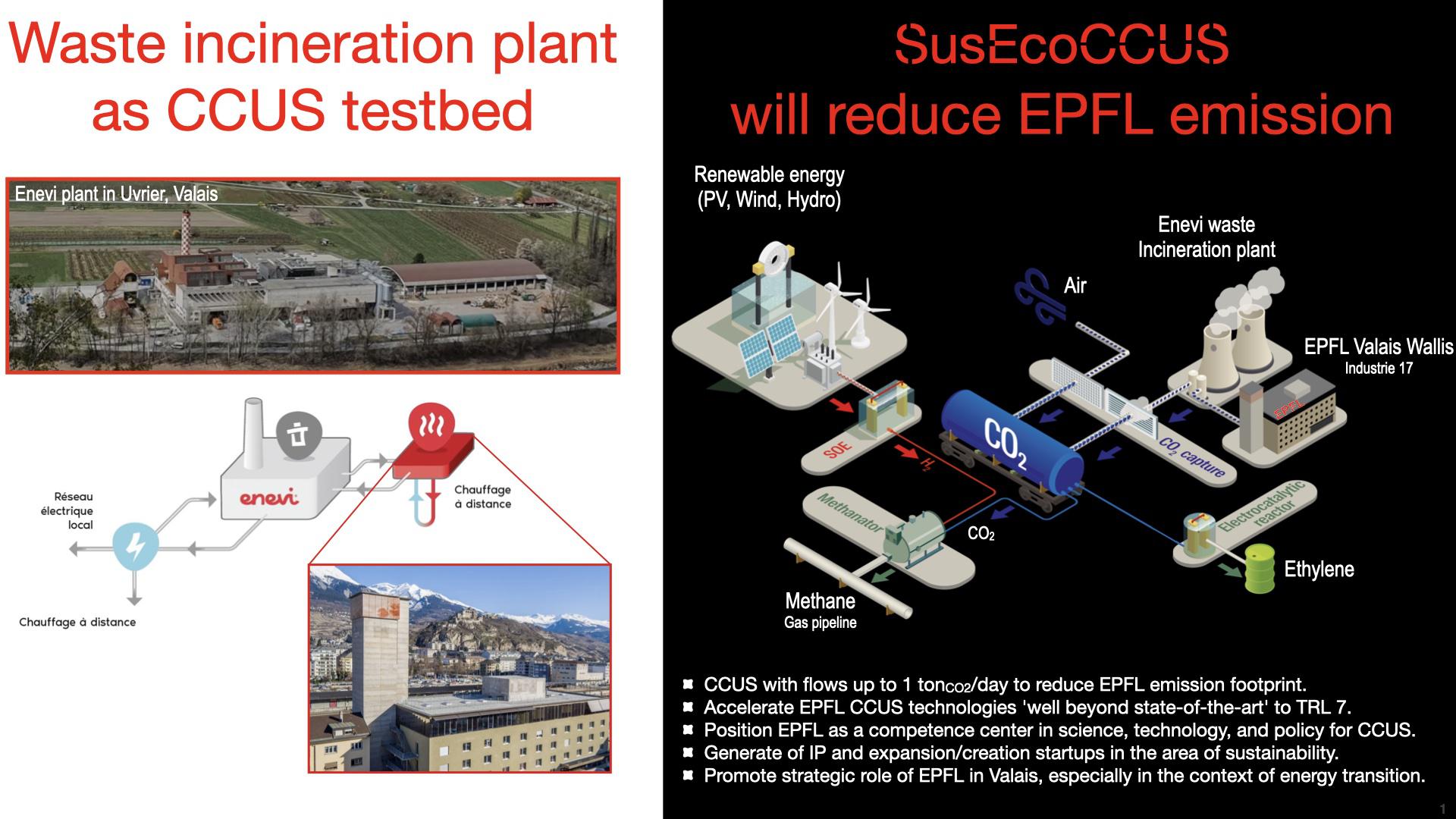
Demonstrators of cost-effective carbon capture, utilization, and storage will be deployed on the EPFL Valais-Wallis campus. ©Olivier Maire / EPFL
EPFL's Solutions4Sustainability initiative challenged all members of the campus to develop projects to promote sustainable solutions for energy and carbon footprint reduction on campus and beyond - and they delivered. Seven ambitious projects will share funds totaling some CHF 20 million.
From ideas to funding in just a few months: In record speed, EPFL's Solutions4Sustainability initiative spawned seven promising projects geared at tackling energy and sustainability challenges, starting on campus. Tapping into EPFL's extensive interdisciplinary expertise in research and innovation, the initiative, launched with support from the school's leadership, brought together students, scientists, and professors with staff members experienced in implementing concrete solutions.
It was an audacious idea from the start, and one that clearly struck a chord across campus. Despite the challenging economic climate, the initiative offers CHF 20 million to finance selected projects. While funding sources typically evaluate projects for their quality and their scientific and innovative merit, Solutions4Sustainability's evaluation committee also judged them for their capacity to be implemented on campus, create new ties with startups and external partners, and federate researchers from EPFL's various labs, faculties, and campuses.
Five short-term projects
"We are thrilled with the response that this initiative has received!" says Ambrogio Fasoli, Associate Vice President for Research at EPFL. "The success of this first phase revealed the campus community's willingness to respond in a very deep, agile, and competitive way to carry out mission-oriented research. While many of the projects had been on people's minds for some time, our call helped bring them together. It all went quite quickly compared to the more conventional mechanisms used in research," he adds.
Solutions4Sustainability's seed fund will finance five short-term projects. While the selected projects are all geared toward promoting sustainability on campus, they target a broad spectrum of specific applications: the food system, vertical farming, solar power generation for smart power grids, and sterilization of research equipment used in life sciences. Because the initiative is ultimately about developing new ways to federate the campus community to bring about change, the solutions will have to be implemented on campus by 2024.
Two longer-term projects
Additionally, the initiative will fund two long-term projects tackling major sustainability challenges for up to six years. If successfully demonstrated on campus, they could be scaled up to benefit society at large. One of the long-term projects focuses on data centers, which, due to their enormous cooling needs, will see their share of global energy demand grow from two percent today to ten percent in 2030. In addition to increasing the sector's carbon footprint, this rapid expansion will impact the scheduling of the power grid's assets.
The project, led by Mario Paolone, director of EPFL's Distributed Electrical Systems Laboratory (DESL), will adopt a multi-pronged approach to decreasing the EPFL data center's carbon footprint and energy needs, building on three main axes. First, it will supply heat extracted from the EPFL data center's CPUs through an on-chip cooling system to the school's district heating system. Then, it will use heat recovered from the data center to generate electricity via an efficient organic Rankine cycle. And finally, it will integrate the data center's power flows into the campus's overall energy network by forecasting applications running on the data center and leveraging a novel power distribution and conversion architecture, as well as optimal coordination with the local photovoltaic power generation, energy storage, and heat demand.
The selected teams are in their starting blocks, ready to kick off their projects!
Drawing on expertise from three faculties (SB, STI, and ENAC) and three EPFL campuses (Lausanne, Sion, and Neuchâtel), the second long-term project aims to develop and deploy demonstrators of cost-effective carbon capture, utilization, and storage (CCUS). Adopting a sustainable and circular economy mindset, the project, which will be headed by Kumar Agrawal, who holds the Gaznat Chair for Advanced Separations (LAS), will integrate five pillars of CCUS: point source capture, direct air capture, CO2 utilization, and sequestration, as well the as the economic enablers of the transition.
One of the demonstrator's highlights will be to reduce EPFL's carbon footprint by capturing CO2 emissions from the waste-incineration plant that supplies the heat used to heat the EPFL Valais campus. Once captured, the CO2 will be converted into methane that can be injected into the natural gas grid and used as a value-added chemical feedstock. By demonstrating the solution's viability on campus, the project will contribute to accelerating market adoption of a technology could prove essential to meeting climate targets by preventing CO2 from entering the atmosphere.

A promising approach for mission-oriented research
While it's still early days for the Solutions4Sustainabilty initiative, it has already proven its potential as a new approach to promote mission-oriented research. According to Ambrogio Fasoli, it triggered the formation of project teams comprising all the relevant expertise available to them from across EPFL's multiple campuses. "Ultimately, the success of this initiative will be measured by its outcomes in terms of scientific results and innovation," says Fasoli. "But clearly, the entire campus community was thirsty for this type of initiative. The selected teams are in their starting blocks, ready to kick off their projects!"






